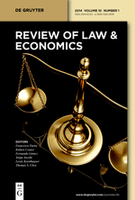
Review of Law & Economics
Scope & Guideline
Fostering Insightful Dialogues on Legal and Economic Intersections.
Introduction
Aims and Scopes
- Legal-Economic Analysis:
The journal prioritizes research that employs economic theories to analyze legal frameworks, focusing on how laws impact economic behavior and market outcomes. - Interdisciplinary Methodologies:
Contributions often utilize diverse methodologies including empirical studies, experimental economics, and theoretical models to explore complex legal issues. - Policy Implications:
Research published in the journal frequently addresses the implications of legal reforms and regulatory changes, aiming to inform policymakers and practitioners. - Global Perspective:
The journal features studies from various jurisdictions, providing a comparative analysis of legal systems and their economic impacts. - Innovation and Technology in Law:
Emerging themes around the intersection of technology, such as artificial intelligence and machine learning, with legal processes and frameworks.
Trending and Emerging
- Data Privacy and Cybersecurity Law:
Recent publications increasingly address issues surrounding data breaches and cybersecurity, reflecting the growing importance of these topics in the legal and economic landscape. - Environmental Law and Economics:
There is a rising focus on the intersection of environmental regulations and economic outcomes, particularly regarding climate change policies and corporate responsibility. - Artificial Intelligence and Law:
A notable trend is the integration of AI into legal analysis, exploring how machine learning and predictive analytics can inform legal decision-making and liability frameworks. - Behavioral Law and Economics:
Emerging studies on behavioral economics are influencing legal frameworks and judicial decisions, particularly in understanding litigants' behaviors and decision-making processes. - Social Justice and Inequality:
The journal is increasingly publishing research that examines the relationship between law, economic inequality, and social justice, highlighting the role of legal systems in addressing or perpetuating inequalities.
Declining or Waning
- Traditional Tort Law:
Research focusing on conventional issues in tort law, such as negligence and liability, has become less prevalent as the journal shifts towards more innovative topics like data breach liability and economic implications of emerging technologies. - Local and Regional Law Studies:
The focus on localized legal studies, particularly those examining specific regional legal practices or historical legal systems, appears to be waning in favor of broader, more comparative analyses. - Static Legal Frameworks:
The exploration of static legal rules without considering dynamic economic factors has decreased, reflecting a shift towards more holistic approaches that integrate economic behaviors and legal consequences. - Historical Legal Analysis:
While historical perspectives remain relevant, the journal's emphasis has shifted towards contemporary issues and their immediate economic implications, leading to a decrease in purely historical legal studies.
Similar Journals

World Competition
Unraveling the Dynamics of Law and Market ForcesWorld Competition is a distinguished academic journal published by KLUWER LAW INT, focusing on the dynamic interplay between law and economics. With its ISSN 1011-4548 and E-ISSN 1875-8436, the journal aims to disseminate high-quality research that explores competitive markets, regulatory frameworks, and economic theory, therefore making significant contributions to the fields of Economics and Law. Situated in the Netherlands, the journal is strategically positioned within a vibrant academic milieu, ranking in the upper quartiles of both categories - Q3 in Economics and Econometrics and Q2 in Law as of 2023. The journal serves as a vital platform for researchers, legal professionals, and students keen on understanding the complexities of competition policy and economic regulations. While it does not offer Open Access options, it remains committed to rigorous peer review and scholarly excellence, making it an essential resource for anyone interested in the evolving landscape of global competition law and economics. With converged years from 2016 to 2024, the journal reflects contemporary issues and trends, ensuring its relevance in today’s fast-paced academic environment.
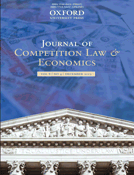
Journal of Competition Law & Economics
Advancing Insights in Antitrust and Market DynamicsThe Journal of Competition Law & Economics, published by Oxford University Press, stands at the forefront of interdisciplinary scholarship, providing a vital platform for the analysis of competition law and economic theory. With its ISSN 1744-6414 and E-ISSN 1744-6422, this UK-based journal has gained significant recognition within the academic community, achieving a Q1 ranking in Law and a Q2 ranking in Economics and Econometrics as of 2023. This distinction highlights the journal's commitment to high-quality research, as evidenced by its Scopus rankings—placing it in the top 22% of Law journals and the top 56% of Economics journals. Covering a range of topics from antitrust regulation to economic impacts on market structures, the journal aims to bridge the gap between legal frameworks and economic principles, fostering a deeper understanding of their interplay. Scholars, practitioners, and students alike will find invaluable insights within its pages, enhancing their engagement with ongoing debates in these critical fields.

European Journal of Law and Economics
Advancing Knowledge at the Convergence of Law and EconomicsEuropean Journal of Law and Economics is a premier academic publication dedicated to the interdisciplinary examination of legal and economic issues, fostering dialogue at the intersection of these vital fields. Published by Springer, this journal, with its ISSN 0929-1261 and E-ISSN 1572-9990, has established itself in the academic community since its inception in 1994 and continues to thrive through its convergence until 2024. Located in the Netherlands, the journal has gained recognition for its rigorous research, reflected in its impressive Scopus rankings, notably ranked Q1 in Law and maintaining a Q2 status in Business and International Management as of 2023. With no Open Access policy, it serves as a vital source for researchers, professionals, and students who seek to deepen their understanding of the economic implications of legal frameworks and vice versa. The journal's focus on empirical studies and theoretical insights makes it an indispensable tool for those looking to innovate within the realms of law and economics.
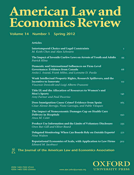
American Law and Economics Review
Innovating Legal Thought through Economic AnalysisAmerican Law and Economics Review, published by Oxford University Press, is an essential journal for those engaged in the intersection of law and economics. With a focus spanning from 2005 to the present, this journal critically examines the role of economic principles in legal frameworks and policy-making. With an impressive classification as Q2 in Law and Q3 in Finance for 2023, it holds a distinguished position in both fields, ranking 313th in Law and 194th in Finance according to Scopus. Although it does not currently offer open access, its robust research contributions provide invaluable insights for academics, practitioners, and policymakers alike, reinforcing its significance in scholarly discussions and enhancing our understanding of legal systems through an economic lens.

FORDHAM LAW REVIEW
Connecting Scholars and Practitioners in Legal ExcellenceFORDHAM LAW REVIEW is a prestigious legal journal published by Fordham University, School of Law, based in the United States. Established to disseminate cutting-edge legal scholarship, this journal has consistently achieved an impactful standing within the field, evidenced by its category ranking as Q1 in Law for 2023 and its Scopus ranking of #428 out of 1025 in the Social Sciences Law category, placing it in the 58th percentile. The journal welcomes submissions across diverse legal topics, fostering discourse that advances both legal theory and practice. Although it does not currently offer open access options, the Fordham Law Review serves as a vital resource for scholars, practitioners, and students seeking insights into contemporary legal challenges and developments. With its rich publication history dating back to the converged years of 1973 through 2024, the journal continues to be a cornerstone for rigorous legal analysis and a platform for influencing the evolution of law.
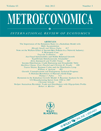
Metroeconomica
Shaping the Future of Economic Research.Metroeconomica is a prestigious journal published by WILEY, focusing on the dynamic fields of Economics and Econometrics. Known for its rigorous peer-review process, this journal prides itself on disseminating high-quality research that informs and inspires scholars and practitioners alike. With an impact factor reflective of its significance in the discipline, Metroeconomica is categorized in the Q2 quartile for 2023, representing its competitive standing among influential economics publications. Since its inception in 1949 and continuing through a converged publication period until 2024, it has contributed significantly to advancing theoretical and empirical knowledge in economics. Researchers can access its content through traditional avenues, encouraging a wide readership among academics and industry experts. As the journal continues to evolve with the changing landscape of economic research, it remains a vital resource for those seeking to explore contemporary economic issues and foster impactful discussions within the field.

Cadernos de Dereito Actual
Navigating the complexities of contemporary law.Cadernos de Dereito Actual is a distinguished peer-reviewed journal published by the University of Santiago de Compostela, focusing on contemporary legal studies and current issues within the field of law. With its open access model instituted since 2013, the journal aims to enhance the accessibility of legal research and foster academic dialogue among researchers, professionals, and students globally. Featuring an ISSN of 2340-860X and an E-ISSN of 2386-5229, Cadernos de Dereito Actual is committed to publishing high-quality articles that contribute to the advancement of legal scholarship. Although specific metrics such as the H-index and Scopus rankings are not currently available, the journal remains a pivotal platform for innovative research and insights within the field of law, promoting rigorous academic standards and interdisciplinary approaches. For further information or to submit your research, please contact the publication service at SERVICIO DE PUBLICACIONES E INTERCAMBIO CIENTIFICO, CAMPUS UNIV SUR, SANTIAGO DE COMPOSTELA 15782, SPAIN.
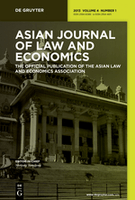
Asian Journal of Law and Economics
Unveiling Critical Perspectives on Global Legal and Economic Issues.Asian Journal of Law and Economics, published by Walter de Gruyter GmbH, operates at the intersection of the law and economics disciplines, offering a unique platform for scholarly discourse since its inception in 2010. With an ISSN of 2194-6086 and an E-ISSN of 2154-4611, this journal has established itself as a reputable source of innovative research, achieving a Q2 quartile ranking in both the fields of Economics and Law as of 2023. The journal aims to provide critical insights into how legal frameworks interact with economic theories, making it an essential resource for researchers, practitioners, and students alike. Additionally, it boasts a respectable ranking within Scopus, reflecting its significance in social sciences, particularly within law and economics. The journal's commitment to fostering a deeper understanding of global legal and economic issues makes it a pivotal read for those engaged in interdisciplinary studies.

Boletin de la Asociacion Internacional de Derecho Cooperativo-International Association of Cooperative Law Journal
Connecting Research and Practice in Cooperative Law.Boletin de la Asociacion Internacional de Derecho Cooperativo-International Association of Cooperative Law Journal, published by UNIV DEUSTO, FAC DERECHO, is a prominent open-access journal since 2000, dedicated to advancing the field of cooperative law. With an ISSN of 1134-993X and E-ISSN 2386-4893, this journal showcases rigorous research, case studies, and theoretical explorations that are essential for legal scholars, professionals, and students interested in the cooperative sector. Operating from Spain, it brings a rich European perspective to global discussions, as reflected in its 2023 ranking in the second quartile (Q2) in Law, with a respectable Scopus rank of #396 out of 1025 and a 61st percentile in Social Sciences_ Law. The journal not only serves as a vital resource for understanding cooperative principles and their legal implications but also promotes interdisciplinary dialogue among researchers and practitioners committed to fostering cooperative enterprises worldwide. Its converged years from 2013 to 2024 indicate an ongoing commitment to embracing contemporary legal challenges while adhering to the highest academic standards.

Vestnik Permskogo Universiteta-Juridicheskie Nauki
Illuminating the Path of Contemporary Legal DiscourseVestnik Permskogo Universiteta-Juridicheskie Nauki, published by the Perm State National Research University, serves as a prominent platform for the dissemination of legal scholarship since its inception. With an Open Access policy implemented in 2009, this journal offers a wide range of legal studies, including comparative law, constitutional law, and international law, making it an essential resource for researchers, academics, and practitioners in the field. Although it is a relatively young publication, its commitment to quality and accessibility has established it as a respected voice in jurisprudence, contributing significantly to both national and international legal discourse. Researchers and students alike will find valuable insights within its pages, encompassing the latest developments and theoretical advancements within Russian and global legal systems. For those looking to stay informed on current legal issues and academic debates, this journal is a must-read.